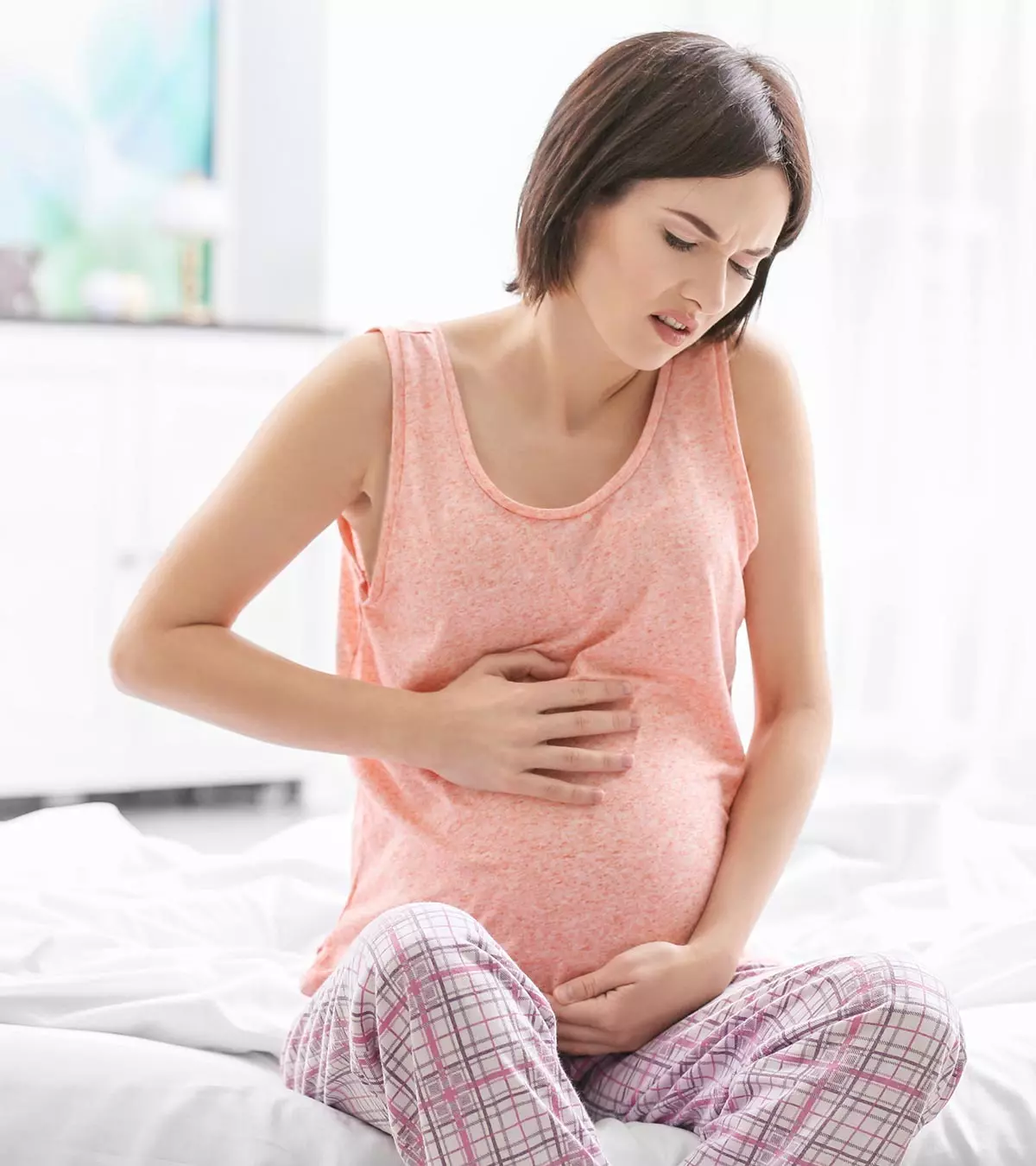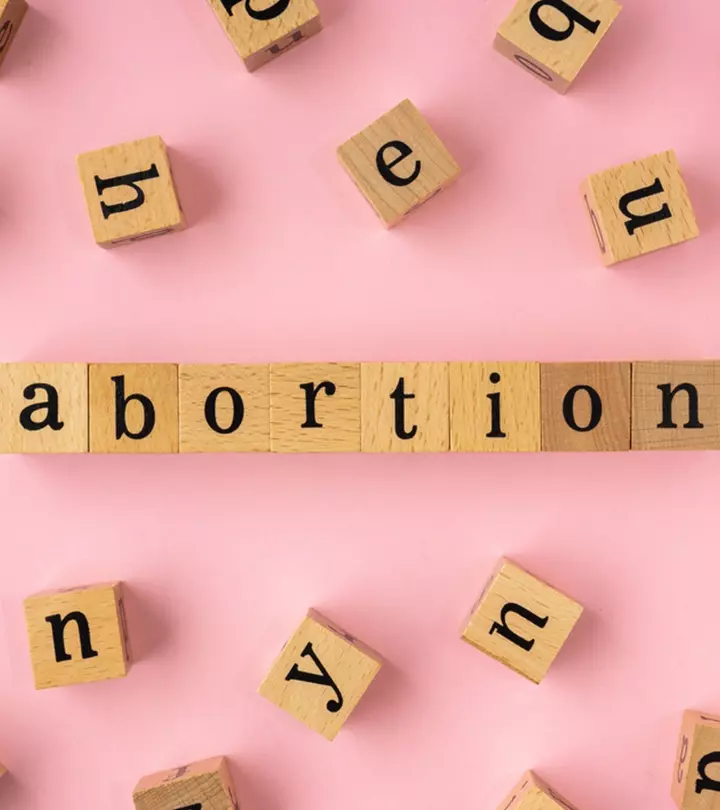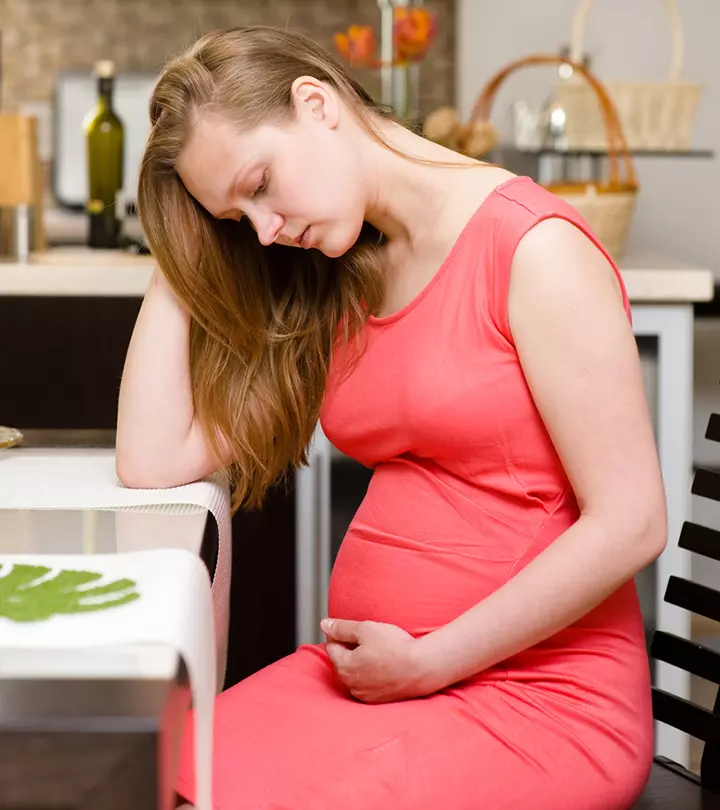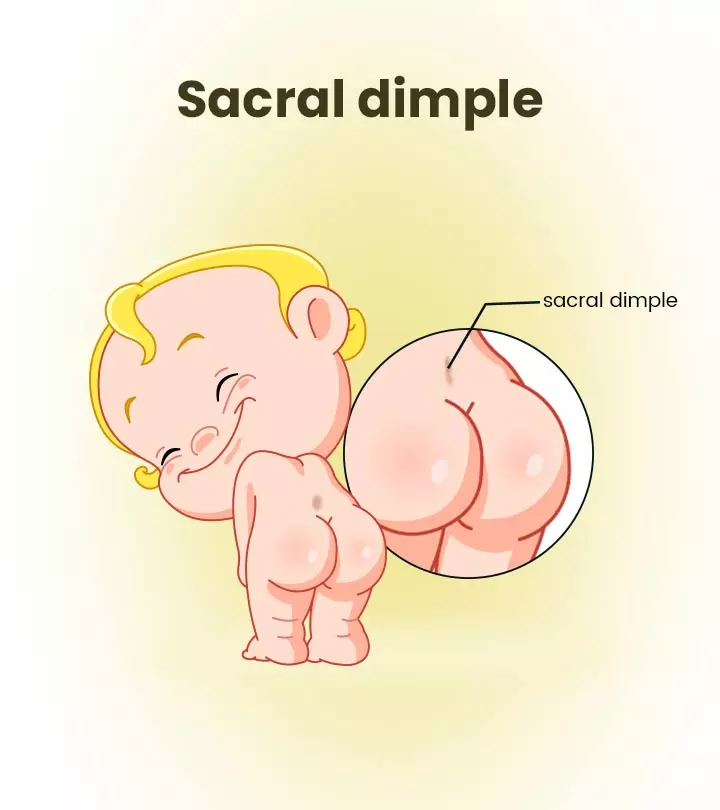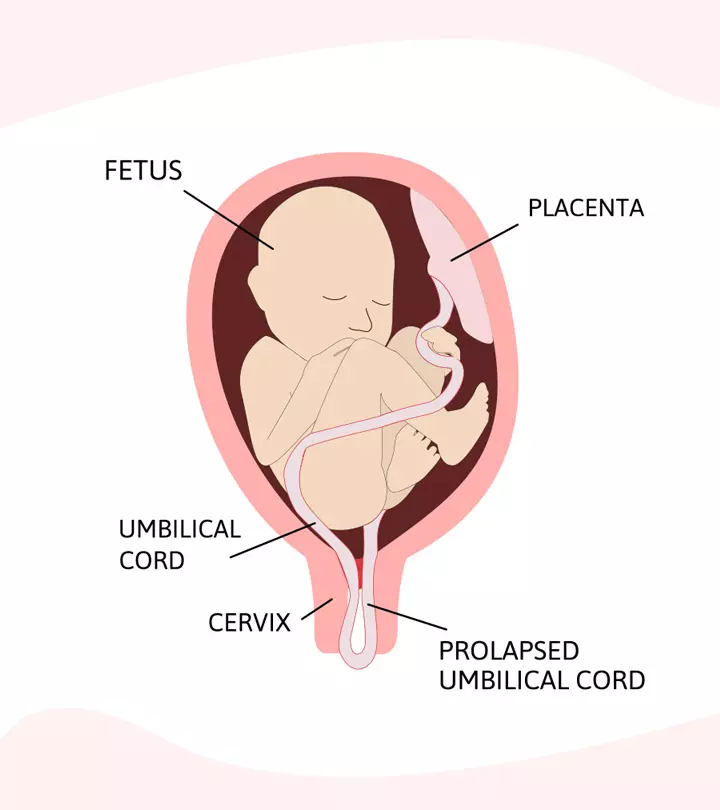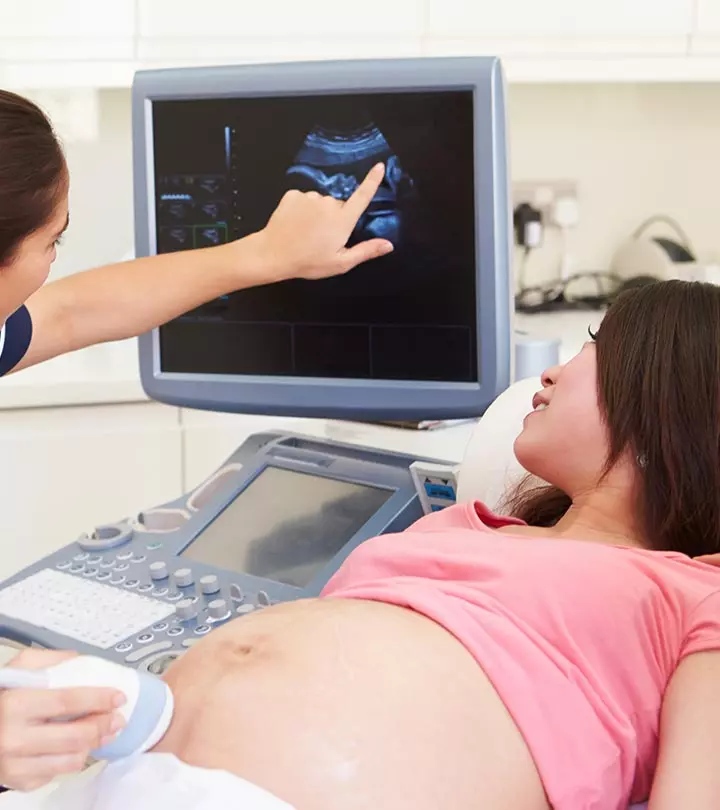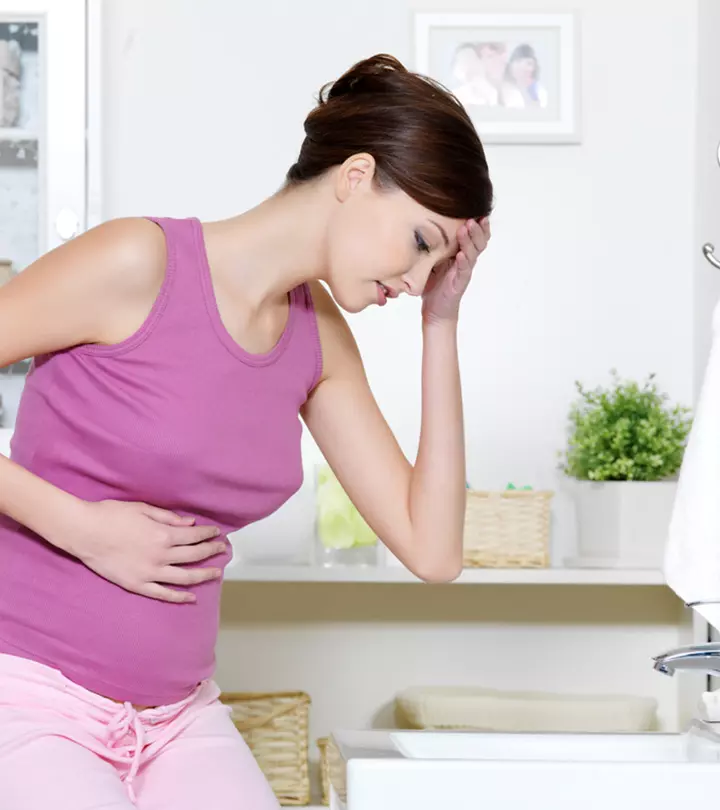
Image: Shutterstock
Irritable bowel syndrome or IBS is a disorder of the intestines that leads to frequent abdominal pain and discomfort (1). IBS is different from inflammatory bowel disease (IBD). IBS and pregnancy may co-exist, especially in women who already had the disorder. The pregnancy condition causes changes in bowel movement and gastrointestinal (GI) discomfort, usually with no underlying pathological causes.

Read on to know about IBS during pregnancy, its causes, symptoms, treatment, risk factors, and possible treatments.
Key Pointers
- Hormonal, psychological, and physical changes during pregnancy may lead to irritable bowel syndrome or IBS.
- Notable symptoms of IBS include abdominal pain, cramps, and changes in bowel movements.
- Lifestyle and dietary changes usually provide relief. Medications may be considered if prescribed by the doctor.
- IBS is not noted to cause any fetal complications. The condition may persist for a long time but does not permanently damage the intestines.
Causes Of IBS During Pregnancy
The connection between IBS and pregnancy is not fully known, and there is insufficient conclusive research on the matter (2). The following pregnancy-related factors may increase the chances of developing IBS during pregnancy (1) (3).
- Hormonal changes: The intestines are directly affected by hormones and the brain’s nerve signals (gut-brain axis).
- Elevated ovarian hormones, such as estrogeniA female sex hormone responsible for the development and regulation of female reproductive organs , affect the intestines and may also change nerve signals. This may cause the intestines to become hypersensitive and more motile.
- High levels of progesteroneiA female reproductive hormone that plays an important role in menstruation, pregnancy, and breastfeeding may lead to a release of smooth muscle fibers mainly to decrease uterine contractions and avoid premature delivery. But this has the side effect of slowing the motility of the large intestine leading to constipation
- It is common to observe pyrosisiA term used for heartburn or a burning sensation in the chest or the throat, caused when the stomach acid backflows to the food pipe and eructationsiA condition in which gas or air in the stomach is released from the mouth , probably explained by delayed gastric emptying and gastroesophageal reflux by the release of the lower esophageal sphincteriA bundle of muscles located at both ends of the esophagus or food pipe and diaphragm orifice. This can also cause gastrointestinal effects such as nausea, vomiting, and heartburn.
- There may also be an increase in the immune response of the intestinal mucosa. These events may eventually lead to IBS.
- Psychological reasons: Pregnant women may often encounter mental stress for various reasons. Stress may affect the nerve signals sent by the brain to the intestines, making them more sensitive and causing them to contract more. Women with anxiety or depression may be prone to IBS due to psychological factors.

- Pressure from the uterus: The growing fetus causes the uterus to enlarge, causing pressure on the gastrointestinal system. It may cause frequent abdominal cramps and changes in bowel habits.
Some non-pregnancy-specific reasons include gastrointestinal infections, such as parasitic and bacterial infections, which may spread through the consumption of contaminated food and water. This type of IBS is called post-infectious IBS.
Common Symptoms Of IBS
The condition is divided into three types, IBS-C (IBS with constipation), IBS-D (IBS with diarrhea), and IBS-M (IBS with mixed bowel habits) (4).
Some pregnant women may notice improvement of symptoms, while for some, it may worsen (5). The symptoms may emerge during any stage of pregnancy.
The signs and symptoms that are commonly seen are as follows (1).
- Diarrhea in IBS-D
- Constipation in IBS-C
- Cramps and pain in the abdomen

- Bloating and gassiness
- Change in bowel habits
- Loss of appetite may occur in some cases
Diagnosis And Treatment For IBS During Pregnancy
There is no specific diagnosis and treatment for IBS (1) (4). The doctor may check symptoms and order different tests, such as stool test, to rule out other problems, such as infections, lactose intolerance, gluten intolerance, and ulcerative colitisiA chronic disease causing inflammation in the colon and the rectum . The more important thing is to be sure there is nor organic lesion or tumor to explain these gastrointestinal symptoms.
The treatment focuses on identifying the triggers for abdominal discomfort and managing the symptoms to prevent discomfort. The following treatments could be considered if you are diagnosed with IBS during pregnancy.
- Hypnosis: The treatment of IBS with the help of hypnosis has been proven effective in several clinical studies. The process of hypnotherapy for treating IBS entails progressive relaxation with the help of sensations distinctly based on the individual’s symptoms (6). Hypnosis may be conducted with other therapies, such as cognitive therapy, depending on the patient’s response.
- Medications: The use of over-the-counter (OTC) medications to treat IBS during pregnancy is usually not recommended due to the potential harmful effects. Medicines may usually be prescribed to reduce diarrhea in case of IBS-D or improve bowel movement in case of IBS-C. The prescribed medication may vary based on various factors, including the severity of IBS and the pregnancy trimester. It can include laxatives, antispasmodicsiMedications that relieve spasms or cramps of smooth muscles such as those in the stomach, intestines, or bladder , and gas absorbent carbon. Speak to your doctor to know medicines to treat your specific condition.
 Point to consider
Point to consider
Home Remedies For IBS
IBS symptoms may be manageable with some interventions at home. You may consider the following practices to reduce abdominal or stomach discomfort.
1. Dietary changes
Dietary modifications include staying hydrated and avoiding broccoli, cabbage, sprouts, excessively spicy foods, and certain other foods that may increase gas during pregnancy. Of course, rapid sugar and carbonated and alcoholic beverages should be avoided during pregnancy.
Studies show that some people with IBS report improvement in diarrhea symptoms if they stop eating gluten (wheat, barley and rye) even if they don’t have celiac disease.
Recent study results have shown that the reduction in consumption of fermentable oli-, di-, and monosaccharidesiSimple forms of carbohydrates that are easily absorbed in the intestines and polyolsiCompounds containing sugar found in certain fruits and vegetables and used as sugar-free sweeteners (FODMAPs) has helped reduce IBS symptoms (7).
FODMAP is a type of carbohydrate that is poorly absorbed by the intestines, causing abdominal discomfort and cramping. Therefore, by adopting a low-FODMAP diet, one can reduce the exposure to sugars that commonly trigger digestive issues like IBS. A few foods rich in FODMAPS include the following (8).
- Beans and lentils
- Certain fruits, such as peaches, pears, apples, and cherries
- Certain vegetables, such as onion, garlic, asparagus, and artichokes

- Wheat products
- Dairy products
You may not show the same sensitivity to all high FODMAP foods. Therefore, maintain a food diary to note the food you eat and the quantity eaten. You can use the diary to check your last meal when you develop symptoms and also share it with your doctor.
Those who have IBS with constipation can alleviate it with the following methods.
- Drink more water
- Include high-fiber food items, such as fruits and vegetables
- Include natural sources of fiber in the diet, such as ispaghula and psyllium husk
You may also try the following general dietary changes to minimize the chances of gastrointestinal discomfort.
- Minimize intake of fatty or deep-fried foods
- Avoid soda or cola and beverages with caffeine such as tea and coffee
- Eat multiple smaller meals
- Eat slowly with small bites
 Quick fact
Quick fact2. Lifestyle changes
These include managing any triggers that lead to IBS symptoms. You may consider the following measures.
- Avoid anxiety, depression, or stress triggers.
- Try relaxation techniques, such as gentle breathing exercises, walking, and other activities, such as listening to music, which may relax you.

- Quit smoking or alcohol.
- Reach out to support groups or have a social circle to speak about your challenges through pregnancy. It may help you vent out your feelings and feel less stressed.
- Consult a counselor or psychologist to learn ways to manage depression or anxiety.
IBS Complications In Pregnancy
There are no specific and widely recognized pregnancy complications associated with IBS. Nevertheless, a study noted spontaneous miscarriage, ectopic pregnancy, preeclampsiaiA pregnancy disorder characterized by high blood pressure, water retention, and protein content in urine , and stillbirth to be complications of having IBS before pregnancy (2). However, there are no additional studies or conclusive research data to prove that IBS can consistently increase the risk of these conditions in most women. The syndrome may last for a long time or a lifetime, but it does not cause permanent damage to the intestines (1). IBS is not life-threatening and does not increase the risk of other gastrointestinal problems (4).
Frequently Asked Questions
1. Does IBS affect the baby during pregnancy?
IBS usually doesn’t affect the baby. Some studies highlighted that IBS before pregnancy increases the risk of miscarriage and ectopic pregnancyiA pregnancy in which the fertilized egg grows outside the uterus, causing pelvic pain and vaginal bleeding (9).
2. Can IBS feel like labor pains?
Yes. In an individual with IBS, colon muscles contract more than people without IBS. This contraction causes cramps and pains, which may be mistaken for labor pains in pregnant women (10).
3. What are the three types of IBS?
IBS can be categorized into the following types (10).
- IBS with constipation (IBS-C): Most of the poop is hard and lumpy
- IBS with diarrhea (IBS-D): Most of the poop is watery and loose
- IBS with mixed bowel habits (IBS-M): Poop is hard and lumpy and loose and watery on the same day
IBS and other gastrointestinal issues often arise during pregnancy due to hormonal changes, stress, and lifestyle changes. IBS can often be managed at home with remedies that can provide long-term benefits and improve quality of life. Although there are known preventive measures for IBS, identifying the triggers and avoiding them can usually prevent the onset of symptoms again.
Infographic: Indicators Of IBS During Pregnancy
Expectant mothers may face additional challenges when dealing with irritable bowel syndrome (IBS), a prevalent digestive disorder. This infographic illuminates the condition’s symptoms during pregnancy, helping you to seek medical advice on time.
Some thing wrong with infographic shortcode. please verify shortcode syntaxIllustration: IBS And Pregnancy: Causes Symptoms Diagnosis & Treatment
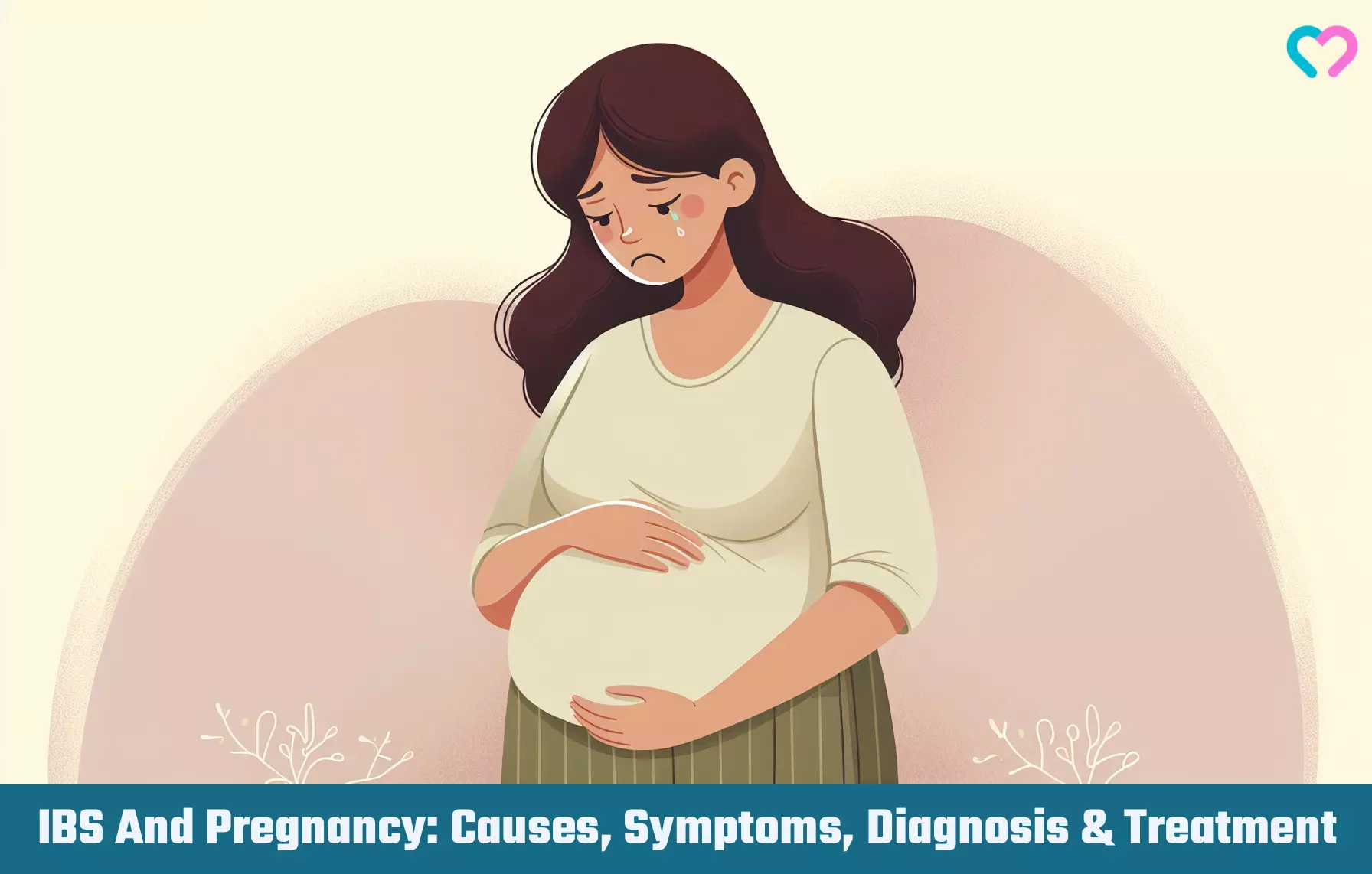
Image: Dall·E/MomJunction Design Team
Irritable bowel syndrome during pregnancy may be quite a challenge to cope with. Learn how to safely manage your symptoms and keep your baby healthy with this helpful video.
References
- Irritable bowel syndrome.
https://www.mountsinai.org/health-library/diseases-conditions/irritable-bowel-syndrome - Moosavi et al.; (2025); Irritable Bowel Syndrome in Pregnancy.
https://journals.lww.com/ajg/fulltext/2025/03000/irritable_bowel_syndrome_in_pregnancy.15.aspx - Pregnancy and Irritable Bowel Syndrome.
https://aboutibs.org/living-with-ibs/pregnancy-and-ibs/ - Irritable Bowel Syndrome (IBS).
https://my.clevelandclinic.org/health/diseases/4342-irritable-bowel-syndrome-ibs - Women and Irritable Bowel Syndrome (IBS).
https://www.med.unc.edu/ibs/wp-login.php?redirect_to=https%3A%2F%2Fwww.med.unc.edu%2Fibs%2Fwp-content%2Fuploads%2Fsites%2F450%2F2017%2F10%2FIBS-in-Women.pdf&privacy=2 - Hypnosis for IBS.
https://aboutibs.org/treatment/complimentary-or-alternative-treatments/hypnosis-for-ibs/ - Eswaran, et al.; (2016); A Randomized Controlled Trial Comparing the Low FODMAP Diet vs. Modified NICE Guidelines in US Adults with IBS-D.
https://journals.lww.com/ajg/Abstract/2016/12000/A_Randomized_Controlled_Trial_Comparing_the_Low.31.aspx - FODMAP Diet: What You Need to Know.
https://www.hopkinsmedicine.org/health/wellness-and-prevention/fodmap-diet-what-you-need-to-know - Ali S Khashan et al.; (2012); Increased risk of miscarriage and ectopic pregnancy among women with irritable bowel syndrome.
https://pubmed.ncbi.nlm.nih.gov/22373726/ - Irritable Bowel Syndrome (IBS).
https://my.clevelandclinic.org/health/diseases/4342-irritable-bowel-syndrome-ibs - IBS in Women
https://aboutibs.org/what-is-ibs/ibs-in-women/
Community Experiences
Join the conversation and become a part of our nurturing community! Share your stories, experiences, and insights to connect with fellow parents.
Read full bio of Dr. Ben Abbes Taarji Hicham
Read full bio of Sanjana Bhattacharjee
Read full bio of Rebecca Malachi
Read full bio of Reshmi Das







